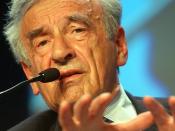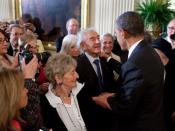Isabel Hambric
Period 5
10/2/2014
"Indifference strengthens evil," a subject truly close to Elie Wiesel's heart. Multiple horrifying experiences in his childhood would ultimately change Wiesel into a prolific writer, professor, Nobel Prize winner, father, husband and activist. "The opposite of love is not hate, it is indifference." Indifference is something that occurs everyday worldwide. From school fights with kids ignoring a victim of a bully to, ignoring starving children on streets. Wiesel's experience during the Holocaust shaped his life crucially as well as his writing.
If you looked in a thesaurus, usually an antonym for love would be hate. To Wiesel this was not the case. He felt when you truly loved someone you would do anything in your power to protect him or her. This is where indifference and love's connection is made. Love involves strong deep feelings, while indifference involves no feelings. While in the concentration camp, Wiesel began to really understand what indifference was.
He felt hate for people who were indifferent. This made him realize a contrast between love and indifference. Wiesel connected the hate he had for indifference to a feeling her strived for love.
Through the hundreds of brutal days, Wiesel spent in the concentration camp everyday he witnessed indifference. His first day in the camp, he saw babies burn to ashes. The fact everyone's lips stayed sealed, completely startled him. People of the same towns, religions, heritage, etc. stood mute not standing up for one another. Only making the enemy stronger. Wiesel also felt indifference from his Hungarian neighbors. As tons of Jewish families were evacuated from the ghetto, Hungarians they had known for years sat and watched. Once again showing no emotions. Wiesel's father had been beaten, one of the first days in camp. His father was humiliated and Wiesel felt...


